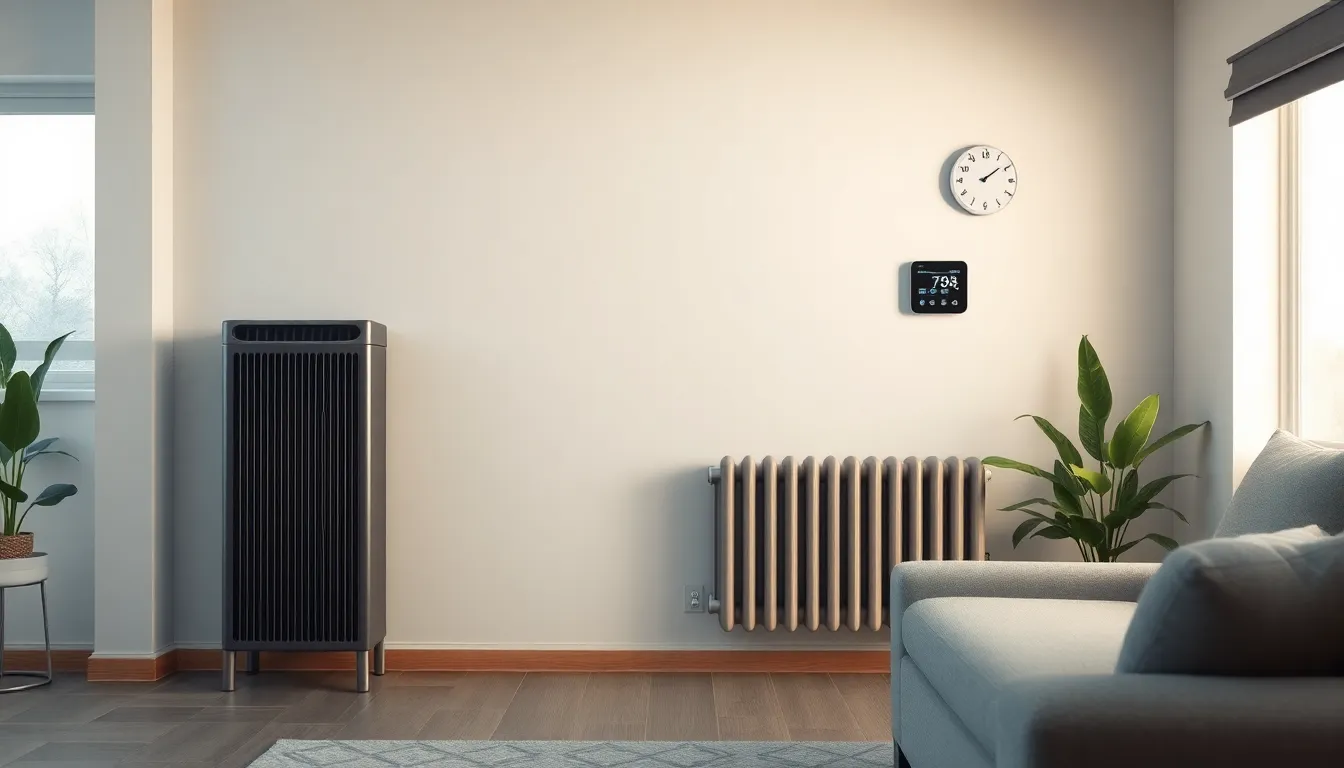Table of Contents
ToggleAs winter approaches and temperatures drop, the quest for the perfect heating system becomes a top priority. Who wants to freeze their toes off in a chilly living room? Not anyone with a good sense of comfort! An efficient heating system can be your best friend, transforming your home into a cozy haven while keeping energy bills in check.
Imagine snuggling up with a warm blanket and a hot cocoa, all while knowing you’re not burning a hole in your wallet. With the right heating solution, you can enjoy warmth without the guilt. Let’s explore how to choose an efficient heating system that not only keeps you toasty but also gives you peace of mind. After all, who wouldn’t want to be the warmest house on the block?
Overview of Efficient Heating Systems
Efficient heating systems play a critical role in maintaining comfort during colder months. These systems provide essential warmth while managing energy expenses effectively.
Types of Efficient Heating Systems
Furnaces and boilers represent two common types of efficient heating systems. Heat pumps serve as versatile options, offering both heating and cooling solutions. Radiant floor heating ensures warmth through heated surfaces, increasing comfort levels in living spaces. Electric heaters can also provide targeted warmth in smaller areas, though usage should be monitored to control costs. Geothermal heating uses the earth’s stable temperature to enhance energy efficiency while reducing utility bills.
Benefits of Efficient Heating Systems
Energy efficiency leads to significant cost savings over time. Reduced environmental impact results from decreased energy consumption, benefiting both homeowners and the planet. Improved comfort levels in living spaces create a more inviting atmosphere. Increased property value often follows the installation of advanced heating systems, attracting potential buyers. Enhanced air quality may also occur with modern systems, leading to healthier indoor environments.
Key Features to Look For

Identifying the right heating system involves several crucial features. Understanding these elements ensures optimal performance and satisfaction.
Energy Source Options
Evaluating energy sources is vital when selecting a heating system. Gas, electricity, and renewable sources each offer unique benefits. Gas systems deliver rapid heating and often lower utility costs. Electric systems provide easy installation and maintenance, making them convenient. Renewable options like solar or geothermal systems reduce carbon footprints and increase energy independence. Each energy source impacts efficiency, cost, and environmental considerations.
Control Systems and Smart Features
Advanced control systems enhance the functionality of heating systems. Smart thermostats allow users to adjust temperatures remotely, promoting energy savings. Programmable features enable schedules according to daily routines, further improving efficiency. Some systems integrate with home automation setups, optimizing overall energy management. These smart capabilities increase user comfort and ensure more consistent heating throughout the home.
Comparative Analysis of Popular Models
Heating systems vary in performance and efficiency, making it essential to analyze popular models. Two models stand out: Model A and Model B.
Model A: Performance and Efficiency
Model A boasts an annual fuel utilization efficiency (AFUE) rating of up to 98%. This high efficiency translates into substantial energy savings. Users report consistent indoor temperatures, regardless of external weather conditions. Advanced technologies in Model A enhance its ability to convert fuel into heat effectively. For example, its modulating gas valve adjusts the flame size, optimizing heat output based on demand. As a result, this feature improves comfort while minimizing energy waste.
Model B: User Experience and Cost
Model B is known for its user-friendly interface and installation flexibility. Owners appreciate the programmable thermostat that simplifies temperature control. It enables users to set schedules for different times of the day, significantly reducing operating costs. Initial investment tends to be lower than that of Model A, making it a more affordable option upfront. Additionally, maintenance costs for Model B remain competitive, contributing to overall long-term savings. Comfort and convenience combine effectively in this model, appealing to a wide range of users.
Installation and Maintenance Considerations
Choosing the right heating system involves understanding installation and maintenance practices. Both play key roles in ensuring optimal performance and longevity.
Professional Installation vs. DIY
Professional installation guarantees adherence to safety and efficiency standards. Many heating systems require specific knowledge for proper setup and operation. Certified technicians possess extensive training and tools to handle complexities that arise. DIY installation might seem cost-effective but often leads to complications. Mistakes during installation can result in reduced efficiency or even system failure. Consulting a professional ensures compliance with local codes and maximizes system effectiveness.
Regular Maintenance Practices
Regular maintenance keeps a heating system running smoothly and efficiently. Routine inspections help identify potential issues before they escalate. Cleaning components like filters and ducts significantly improves airflow and indoor air quality. Scheduling annual check-ups can detect gas leaks or mechanical wear early. Technicians can provide necessary adjustments, ensuring optimal performance throughout the season. Commitment to maintenance extends the lifespan of the heating system, ultimately saving on repair costs.
Selecting the right heating system can transform a home into a warm sanctuary during the colder months. By prioritizing efficiency and comfort, homeowners can enjoy a cozy atmosphere while keeping energy expenses in check.
With various options available, it’s crucial to consider individual needs and preferences when choosing a system. The right features and energy sources can significantly impact both comfort levels and environmental sustainability.
Investing in a high-efficiency heating system not only enhances indoor air quality but also contributes to long-term savings and increased property value. Embracing these solutions ensures a comfortable living space that aligns with modern energy-saving practices.




